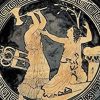The Furies explain that Orestes is guilty of matricide. After questioning them further, Athene remarks that they seem more concerned with the forms of justice than with justice itself. The Furies invite her to interrogate Orestes and decide for herself about his guilt. Athene agrees but insists that the final authority of judgment in the case be given to her. The chorus confidently accepts her proposal.
Athene turns to Orestes and asks for his side of the story. He states again that he is no suppliant because he has already been purified for his crime. Orestes identifies himself to Athene, tells how Agamemnon was treacherously murdered by Clytaemestra on his return home from Troy, and how he later came back from exile and killed his mother to avenge his father’s death. He says that Apollo shares the responsibility for his crime because the god ordered him to commit matricide and threatened terrible retribution if he failed to obey. “This is my case,” Orestes says, “Decide if it be right or wrong. / I am in your hands. Where my fate falls, I shall accept.”
Athene reflects for a moment, then states that this is a matter too complex for any single mortal to judge and that even she does not have the right to decide the issue alone. It is a serious legal and moral dilemma, but since she has taken the case on herself, she will establish a special court made up of the finest of her citizens to hear the evidence and come to a decision. Athene goes out to select the jurors, promising that “They shall swear to make no judgment that is not just, and make clear where in this action the truth lies.”
Analysis
Athene’s attitude in this scene implies that the trial will be concerned with things of far greater importance than the merely technical question of whether or not Orestes is guilty of matricide. Her refusal to arbitrate the case herself and the establishment of a special new court represent the replacement of archaic, autocratic justice with the new form of civic justice, in which an entire society unites to determine and enforce its conceptions of right and wrong.

